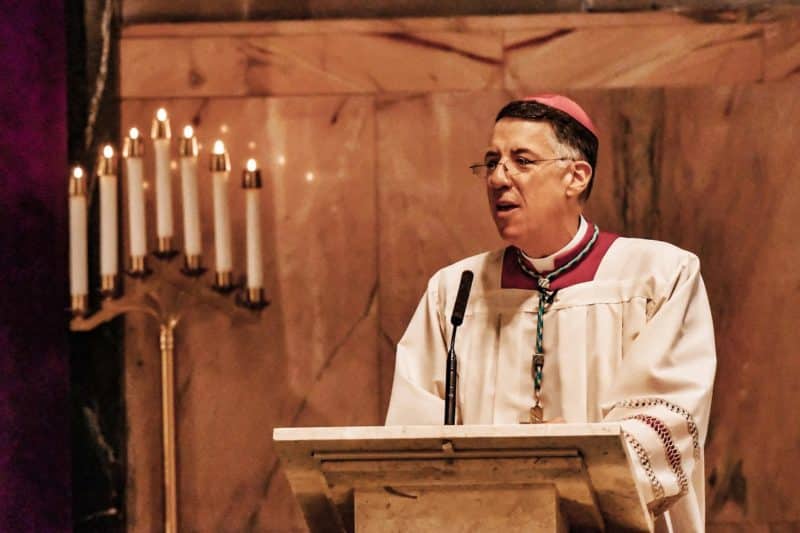WASHINGTON (CNS) – A study of US priests released on October 19 details clerics’ “crisis of trust” toward their bishops, as well as fear that if they were falsely accused of abuse, prelates would immediately throw them “under the bus” and not help them clear their name.
The study “Well-being, Trust and Policy in a Time of Crisis” by The Catholic Project, written by Brandon Vaidyanathan, Christopher Jacobi and Chelsea Rae Kelly, of The Catholic University of America, paints a portrait of a majority of priests who feel abandoned by the men they are supposed to trust at the helm of their dioceses.
And while the study says priests overwhelmingly support measures to combat sex abuse and enhance child safety, the majority, 82 per cent, also said they regularly fear being falsely accused. Were that to happen, they feel they would face a “de facto policy” of guilty until proven innocent.
The study, unveiled at The Catholic University of America in Washington, documents the environment between priests and their bishops in light of the “Charter for the Protection of Children and Young People” instituted in 2002 by the US Conference of Catholic Bishops.
The study reveals that 40 per cent of the priests who responded said they see the zero-tolerance policy as “too harsh” or “harsher than necessary”, adding that it’s too easy to lodge false claims of abuse against them. They feel bishops would not support a priest in the period necessary to prove his innocence.
Of the 10,000 diocesan and religious priests surveyed, just 24 per cent said that they had confidence in US bishops in general. Instead, priests in the study said they predominantly see the prelates as social climbers, careerists and administrators who barely know priests in their diocese by name.
The study says 131 bishops also participated in the study, which analysed attitudes about priests’ well-being, trust and the policy related to the sex abuse crisis.
In response to the study, the USCCB’s Public Affairs Office released a statement by Bishop James Checchio of Metuchen, New Jersey, chairman of the organisation’s Committee on Clergy, Consecrated Life and Vocations.
“I am grateful for the insight provided by this study which will assist the bishops in our ministry to our priests. While not surprised, I am heartened that the results report priests have such a high level of vocational fulfilment and that they remain positive about their priestly ministry,” Bishop Checchio said in the October 19 statement.
The bishop referred to a figure in the document that showed that 77 per cent of the priests in the study could be categorised as “flourishing” – saying they felt fulfilled and had a sense of meaning and purpose – and 4 per cent reporting that they were thinking of leaving the priesthood.
“Our priests are generous and committed,” Bishop Checchio continued. “While acknowledging that circumstances will vary from diocese to diocese, the findings of this study are overall valuable in that they remind us of the importance of being always attentive to the care of our priests with the ever-growing stressors they experience in ministry, while we strive to address any issues that have damaged the unique relationship we enjoy.”
The study says that the “erosion of trust between a priest and his bishop” affects the level of well-being of a priest, and those with more trust fare better than others.
It also points out a great disparity of perception between the two groups, with bishops overwhelmingly seeing their role as more supportive of clerics. The majority of bishops surveyed said that they felt their role was akin to a brother, a father, a shepherd, a co-worker, when it came to dealing with priests.
Priests said that strengthening relationships with bishops, having more social interaction with them, have the prelates know their names, communication, transparency about processes, as well accountability on prelates’ part would help alleviate the existing erosion of trust.
“Perhaps some bishops see themselves through rose-coloured glasses,” a summary of the study said. “Or perhaps priests, in a beleaguered and prolonged state of stress and uncertainty, unfairly characterise their bishops through a lens of cynicism and fear. Or perhaps there is some truth to both perspectives.”
Photo: Bishop James Checchio of Metuchen, N.J., speaks at the Cathedral of St. Francis of Assisi in Metuchen, where via livestream he leads the faithful of the diocese in the rosary and a prayer of renewal Dec. 11, 2020, the vigil of the feast of Our Lady of Guadalupe. (CNS photo/Gerald Wutkowski Jr., courtesy Diocese of Metuchen)

Reader Interactions